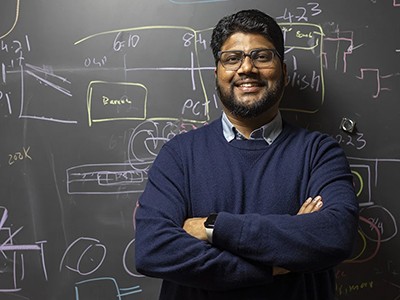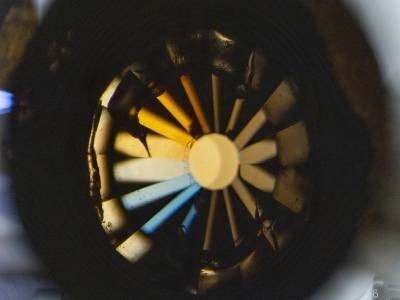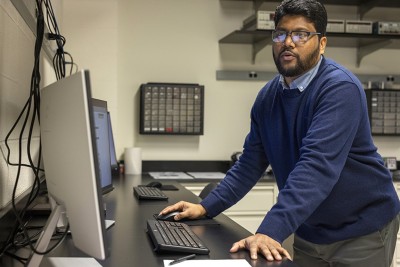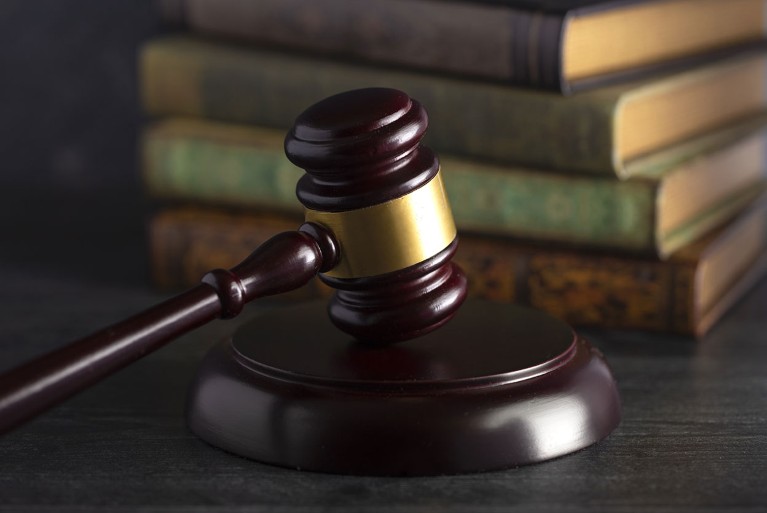A judge has dismissed a lawsuit brought by superconductivity physicist Ranga Dias against his employer, the University of Rochester in New York. In February, a university investigation found that he had committed scientific misconduct by, among other things, fabricating data to claim the discovery of superconductors — materials with zero electrical resistance — at room temperature. Dias filed the lawsuit against the university for allegedly violating his academic freedom and conducting a biased investigation into his work.
Exclusive: official investigation reveals how superconductivity physicist faked blockbuster results
On 19 April, Monroe County Supreme Court justice Joseph Waldorf denied Dias’s petitions and dismissed the lawsuit as premature. The matter “is not ripe for judicial review”, Waldorf wrote (see Supplementary information), because, although Rochester commissioned an independent review that found Dias had committed misconduct, it has not yet finished taking administrative action. The university provost has recommended that Dias be fired, but a final decision is still forthcoming.
A spokesperson for the university said Rochester was “pleased” with the justice’s ruling, and reiterated that its investigation was “carried out in a fair manner” and reached a conclusion that it thinks is correct.
Dias did not respond to requests for comment. His lawyer, Morgan Levy, referred Nature’s news team to documents filed with the lawsuit in which Dias responded to the university’s investigation.
Nature’s news team reported on Rochester’s investigation previously: three scientists external to the university conducted a 10-month probe into 16 allegations against Dias and determined that the physicist had committed plagiarism, and data fabrication and falsification related to four scientific papers, including two published in Nature1,2. (Nature’s news team is editorially independent of its journals team.) Normally, the details of the investigation would probably have remained confidential. But in response to Dias’s lawsuit, the university submitted the entire report as a court exhibit, making it public.
Other documents and e-mails from Dias made public owing to the lawsuit reveal more details about the physicist’s attempts to halt the investigation and to cast doubt on former graduate students from his laboratory who had shared concerns with investigators about data in one of the blockbuster Nature papers2, and who later requested its retraction. Nature’s news team spoke about the lawsuit to four of Dias’s former students, who requested anonymity because they were concerned about the negative impact on their careers. They disagree with Dias’s characterization of events in the e-mails submitted to the court. One student described Dias’s attitude as “it’s not me that’s wrong, it’s everyone around me”.
Toxic environment
In March 2023, the National Science Foundation (NSF), which funds US academic research — including much of Dias’s — ordered Rochester to investigate allegations that Dias committed scientific misconduct when he claimed to have discovered room-temperature superconductivity in a material made of carbon, sulfur and hydrogen at room temperature1. This order followed three internal ‘inquiries’ into Dias’s work by the university, which did not find evidence of misconduct. Prompted by the NSF, Stephen Dewhurst, the then-interim vice-president for research at Rochester, organized a committee of three external experts to undertake the investigation.
Superconductivity scandal: the inside story of deception in a rising star’s physics lab
Dias initially appeared pleased with the investigators. After his first interview with them, he sent Dewhurst an e-mail on 16 June 2023, writing that he welcomed the university’s “comprehensive neutral unbiased independent investigation into all the allegations”. Later, his opinion of the investigation would change.
When the investigators interviewed Dias’s graduate students the next month, serious issues came to light, according to court documents: the students said that Dias dismissed their concerns about the veracity of certain data and that he had created a culture of fear in the lab. Speaking to Nature's news team, one student says that Dias apparently retaliated against them for reporting concerns to another faculty member at Rochester. The news team reviewed a memo written by the student immediately after the incident. The student recorded Dias as saying that “an adviser is like your parents — you can’t remove them, you’re stuck with them”.
In a 3 August 2023 e-mail to Dias, Wendi Heinzelman, dean of Rochester’s engineering school, told the physicist that his students would be moved to new advisers. Dias objected and expressed concern that the decision would affect the ongoing investigation. “Reassignment of my students has inadvertently conveyed a perception of wrongdoing on my part,” he responded. In that e-mail, Dias blamed the decision on two students he said were biased against him, alleging that one created a toxic environment in the lab and that the other was “a distraction to other students”.
Nature retracts controversial superconductivity paper by embattled physicist
Nature’s news team showed the e-mail to other former graduate students, who said that the toxic environment was caused by Dias. The students he accused of being biased against him “were not the issue in the group, and they tried their hardest to make it work”, says one of the former students.
In September 2023, five of Dias’s former students decided to ask for a retraction of a Nature paper that claimed that the team had observed room-temperature superconductivity in a lutetium-based material at relatively low pressures2. Dias found out and sent them each a cease-and-desist letter, as previously reported by Nature’s news team. At the same time, the physicist sent his first formal concerns about the investigation committee to the NSF, court documents show.
He alleged bias, conflicts of interest and a lack of expertise on the part of the investigators. Rochester administrators reviewed the claims and, in a letter to the NSF, concluded that the investigation was fair.
Legal trouble
Dias sued the university in December last year, alleging that his academic freedom was violated when he was stripped of his students. He filed another lawsuit in February, first attempting to stop the investigation, then to prevent it from becoming public. A judge denied both requests.
The case was eventually moved to a new justice, Waldorf, who heard arguments from lawyers representing Dias and Rochester in early April. In his decision to dismiss Dias’s lawsuit, Waldorf cited a previous ruling that “absent extraordinary circumstances, courts are constrained not to interject themselves into ongoing administrative proceedings”. These proceedings will determine whether Dias, who does not yet have tenure, will be fired. The final decision rests with Rochester’s board of trustees.
Nature’s news team spoke with scholars about Waldorf’s ruling, which was based on a cut-and-dried precedent. “The decision is unassailable,” says Matthew Finkin, a labour law and academic-freedom scholar at the University of Illinois at Urbana-Champaign. Scott Gelber, a historian of education at Wheaton College in Norton, Massachusetts, summed up his thoughts: “Academic freedom doesn’t protect academic misconduct.”


 Exclusive: official investigation reveals how superconductivity physicist faked blockbuster results
Exclusive: official investigation reveals how superconductivity physicist faked blockbuster results
 Superconductivity scandal: the inside story of deception in a rising star’s physics lab
Superconductivity scandal: the inside story of deception in a rising star’s physics lab
 Nature retracts controversial superconductivity paper by embattled physicist
Nature retracts controversial superconductivity paper by embattled physicist
 ‘A very disturbing picture’: another retraction imminent for controversial physicist
‘A very disturbing picture’: another retraction imminent for controversial physicist







